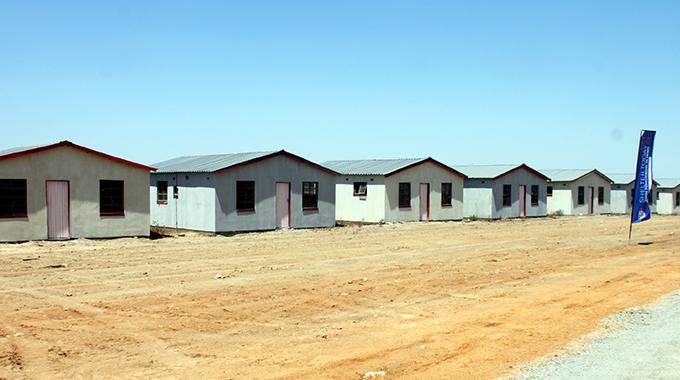News / National
Proposed law to compel civil servants to disclose assets
19 Jun 2025 at 06:06hrs |
7 Views

Zimbabwe's Cabinet has approved the Public Service Amendment Bill, a major legislative step aimed at modernising the civil service, increasing transparency, and aligning the current framework with the Constitution. One of the most notable provisions in the Bill is a requirement that public servants disclose their assets to the Corporate Governance Unit, in line with the Public Entities Corporate Governance Act.
Addressing journalists during a post-Cabinet media briefing in Harare on Tuesday, Information, Publicity and Broadcasting Services Minister Dr Jenfan Muswere said the asset disclosure clause is designed to prevent conflicts of interest and restore public confidence in government institutions. He explained that the amendment to the Public Service Act [Chapter 16:04] also provides for the establishment of a Public Service Academy to promote continuous professional development and training among civil servants.
The Bill introduces progressive reforms aimed at improving the welfare and rights of government employees. Dr Muswere stated that female employees will now be entitled to 98 days of fully paid maternity leave. Additionally, the new law prohibits workplace violence and harassment, including those of a gender-based or sexual nature. It also promotes merit-based appointments and promotions within the public sector, ensuring that discrimination has no place in civil service employment practices.
On the administrative front, the proposed amendments empower permanent secretaries to manage and supervise civil servants within their respective ministries. This will be done under the guidance of the responsible minister and in consultation with the Public Service Commission. The Bill also enhances the supervisory role of the Chief Secretary to the President and Cabinet over the permanent secretaries, reinforcing accountability at the highest levels of the bureaucracy.
In a separate development, Cabinet approved a trilateral treaty involving Zimbabwe, Botswana, and South Africa for the creation of the Greater Mapungubwe Transfrontier Conservation Area. The conservation area is aimed at protecting the region's shared natural and cultural heritage while fostering sustainable livelihoods for communities living within and around the conservation zones.
Dr Muswere said the Treaty formalises cross-border cooperation between the three countries and will serve as a model for environmental protection, cultural preservation, and community empowerment. He said the initiative is rooted in shared values and heritage among the populations living in the Greater Mapungubwe region.
The transfrontier conservation area will encompass the Tuli Circle Safari Area, Maramani, and surrounding wildlife zones in Zimbabwe, the Northern Tuli Game Reserve in Botswana, and the Mapungubwe National Park and World Heritage Site in South Africa. According to Dr Muswere, the treaty is expected to promote ecosystem integrity, biodiversity conservation, and socio-economic development through eco-tourism and heritage preservation.
Cabinet's approval of both the Public Service Amendment Bill and the conservation treaty signals Zimbabwe's commitment to institutional reform and regional cooperation in sustainable development.
Addressing journalists during a post-Cabinet media briefing in Harare on Tuesday, Information, Publicity and Broadcasting Services Minister Dr Jenfan Muswere said the asset disclosure clause is designed to prevent conflicts of interest and restore public confidence in government institutions. He explained that the amendment to the Public Service Act [Chapter 16:04] also provides for the establishment of a Public Service Academy to promote continuous professional development and training among civil servants.
The Bill introduces progressive reforms aimed at improving the welfare and rights of government employees. Dr Muswere stated that female employees will now be entitled to 98 days of fully paid maternity leave. Additionally, the new law prohibits workplace violence and harassment, including those of a gender-based or sexual nature. It also promotes merit-based appointments and promotions within the public sector, ensuring that discrimination has no place in civil service employment practices.
On the administrative front, the proposed amendments empower permanent secretaries to manage and supervise civil servants within their respective ministries. This will be done under the guidance of the responsible minister and in consultation with the Public Service Commission. The Bill also enhances the supervisory role of the Chief Secretary to the President and Cabinet over the permanent secretaries, reinforcing accountability at the highest levels of the bureaucracy.
In a separate development, Cabinet approved a trilateral treaty involving Zimbabwe, Botswana, and South Africa for the creation of the Greater Mapungubwe Transfrontier Conservation Area. The conservation area is aimed at protecting the region's shared natural and cultural heritage while fostering sustainable livelihoods for communities living within and around the conservation zones.
Dr Muswere said the Treaty formalises cross-border cooperation between the three countries and will serve as a model for environmental protection, cultural preservation, and community empowerment. He said the initiative is rooted in shared values and heritage among the populations living in the Greater Mapungubwe region.
The transfrontier conservation area will encompass the Tuli Circle Safari Area, Maramani, and surrounding wildlife zones in Zimbabwe, the Northern Tuli Game Reserve in Botswana, and the Mapungubwe National Park and World Heritage Site in South Africa. According to Dr Muswere, the treaty is expected to promote ecosystem integrity, biodiversity conservation, and socio-economic development through eco-tourism and heritage preservation.
Cabinet's approval of both the Public Service Amendment Bill and the conservation treaty signals Zimbabwe's commitment to institutional reform and regional cooperation in sustainable development.
Source - The Herald
Join the discussion
Loading comments…






























